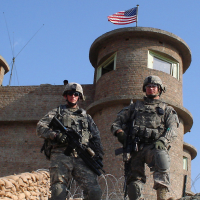U.S.-Afghan “Breakthrough”: Troops Stay 10 More Years and Allowed to Raid Afghan Homes if Obama Apologizes
 Bagram black prison (photo: Department of the Army)
Bagram black prison (photo: Department of the Army)
Just say you’re sorry. That’s all it will take for the United States to keep its military presence in Afghanistan beyond 2014—for up to another 10 years, in fact, according to Afghan officials.
After months of negotiations between Washington and Kabul, Afghanistan’s top leader, President Hamid Karzai, reportedly signaled to the U.S. that he would support a continuation of the American military mission in his country beyond next year, and even accept U.S. Special Forces raiding private homes.
But Karzai wanted something first: a letter from President Barack Obama apologizing for the harm that U.S. forces have brought on Afghan civilians over the past 12 years.
If Obama agreed, Karzai would encourage the loya jirga, a council of more than 2,500 elders and officials, to vote for the new security pact between the U.S. and Afghanistan.
Publicly, the Obama administration denied that Obama intended to offer any apology to Karzai.
Susan Rice, the national security adviser, told CNN: “No such letter has been drafted or delivered….There is not a need for the United States to apologize to Afghanistan. Quite the contrary. We have sacrificed and supported them in their democratic progress and in tackling the insurgency and Al Qaeda.”
But, privately, a senior State Department official told The New York Times that a letter was in the works that would acknowledge past problems, such as civilian casualties.
“We will consider his request for reassurances, including the option of a letter from the administration stating our position,” the official told the Times on condition of anonymity.
A spokesman for Karzai said the letter is expected to “mention that there were mistakes made in the conduct of military operations in the past, in the conduct of military operations by United States forces in the last decade, and that Afghans have suffered, and that we understand the pain and therefore we give assurances and make sure those mistakes are not repeated,” according to the Times.
The new security agreement would allow American raids to search and detain militants within Afghan homes, but only under “extraordinary circumstances” to save the lives of U.S. soldiers. Such raids on private homes are said to be extremely offensive to Afghan citizens.
The only other sticking point had been the U.S. demand that its troops be immune from Afghan prosecution for any actions they take in the country. Karzai has reportedly now acquiesced on this matter.
Thousands of American troops could remain in Afghanistan, if both sides approve the deal, which could result in the U.S. spending billions of dollars more on fighting the insurgency.
A draft document (pdf) obtained by NBC News showed the agreement would begin on January 1, 2015, and “remain in force until the end of 2024 and beyond.”
-Noel Brinkerhoff
To Learn More:
Afghans Demand That U.S. Admit Military Errors (by Rod Nordland, New York Times)
Rice: Reports of a U.S. Apology to Afghanistan are False (by Chelsea Carter and Elise Labott, CNN)
As Afghan Pact Is Reached, Kerry Says Apology Wasn’t Considered (by Thom Shanker, New York Times)
Endless Afghanistan? US-Afghan Agreement Would Keep Troops in Place and Funds Flowing, Perhaps Indefinitely (by Richard Engel, NBC News)
U.S. to Offer Afghans Assurances to Remove Hurdle in Post-2014 Deal (by Karen DeYoung and Tim Craig, Washington Post)
U.S. to Lose Oversight of Afghanistan Reconstruction Projects worth Billions (by Noel Brinkerhoff and Danny Biederman, AllGov)
U.S.-Afghanistan Agreement Hinges on Immunity for American Troops (by Noel Brinkerhoff, AllGov)
- Top Stories
- Unusual News
- Where is the Money Going?
- Controversies
- U.S. and the World
- Appointments and Resignations
- Latest News
- Musk and Trump Fire Members of Congress
- Trump Calls for Violent Street Demonstrations Against Himself
- Trump Changes Name of Republican Party
- The 2024 Election By the Numbers
- Bashar al-Assad—The Fall of a Rabid AntiSemite






Comments